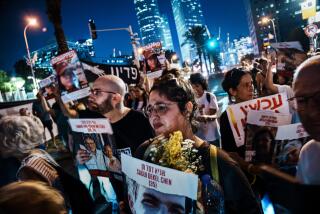Bosnia Holds Welsh Town Hostage : Balkans: Citizens of Wrexham hold their breath awaiting word on fate of 33 hometown soldiers captured by Serbs.
- Share via
LONDON — The complexities of the war in Bosnia-Herzegovina were sinking in the hard way Monday in the northern Welsh town of Wrexham as friends and relatives of the 33 British soldiers taken hostage by Bosnian Serbs anxiously awaited news of their fate.
Kevin Blanchfield, based in Wrexham as the North Wales field officer for the Royal British Legion, said the community--home to the 300-year-old Royal Welch Fusiliers Regiment--is on edge awaiting news of the hostages.
“Everybody is just wearing their knees out praying and hoping that these lads will get back,” he said of the hostages, who were captured near the Bosnian “safe area” of Gorazde on Sunday. “We’re appalled, because they went out there to stop the slaughter. To take them hostage is just a crime against humanity.
“The regiment has quite deep roots in the community. They all agree that it’s a callous action to use peacekeepers for political ends.”
Pauline Jones, the mother of 19-year-old hostage Lee Jones, said: “I didn’t expect there to be so much trouble out there. It was only peacekeeping--but now this has happened. It’s turned out bad.”
And brother Gary, 24, said: “I think the time has come for the troops to be pulled out now. This has gone too far.”
Jane Hughes, whose son, Justin, is on peacekeeping duty in Bosnia, agreed, saying the troops should be pulled out as soon as possible. She predicted that there will be many casualties if they remain.
“If they went out there to fight, I could understand it,” she said, “but they didn’t. They went out there as a peacekeeping force to help them. Now hostages are taken it is obvious they are not wanted and they should leave. Why should we lose--perhaps like me--our sons?”
The first British soldier to die in the Balkans was from Wrexham. Lance Cpl. Wayne Edwards was driving an armored vehicle and was hit by small-arms fire in 1991.
His mother, Barbara Edwards, said of the hostage-taking: “These boys have gone out there not to fight but to keep the peace. We have seen too many young men dying in the prime of their lives.”
One of the Welsh voices on the side of keeping troops in Bosnia was the Rev. Morgan Llewellyn, who once commanded the regiment and retired as a major general before becoming a cleric and chaplain.
His 24-year-old son, Glyn, is a lieutenant with the Fusilier force in Gorazde. Of his son, he said, “He, like all the other young ones out there, sees what they are doing as important.
“He is a soldier and I have been a soldier, and all you can do is hope that they are all right--that they will make the right decision when the time comes and cope with the circumstances.”
Llewellyn, who served with the regiment for 36 years, said he had spoken to the commanding officer of the battalion, Lt. Col. Jonathan Riley, on Saturday evening before the hostage-taking.
“He was obviously concerned about supplies coming in but said morale continued to be high. He said his soldiers were doing an excellent job and were stoical in the face of what’s been going on in Sarajevo, the Bosnian capital.
“The soldiers can take heart from the fact that no shots were fired. It is a political move, and we must trust and pray fervently that it will be resolved quickly.”
Elfyn Llwyd, a Welsh nationalist member of Parliament, called for the United Nations to pull out.
“With heavy heart I have to say that as both sides want to keep on fighting, there is no peace to keep,” he said. “I am desperately worried about our troops out there, and I urge the government to get them out sooner rather than later. They’re just sitting targets.
“I have spoken to many of the families, and quite frankly I think they have come to agree with my view. I know contingency plans have been made to get the troops out, and I think they should be put into operation now.”
Military commentators pointed out that the additional troops earmarked Sunday to beef up the British contingent in Bosnia have a heavy engineering and artillery component--which could be useful if the British U.N. contingent had to withdraw.
The British government emphasized Monday that the additional troops being sent to Bosnia beginning today won’t be dragged into “an all-out war.”
Defense Minister Malcolm Rifkind said: “We are not fighting a war, but the protection of our own forces is a crucial requirement.”
Thus, it appears that for now the British government hopes to keep peacekeeping troops in Bosnia--but is prepared to pull out quickly if events dictate that course.
The British media have differed editorially on whether to remain in Bosnia.
The best-selling tabloid, the Sun, declared Monday: “The sole aim must be to free the hostages unharmed. Then we should pull out of this dangerous war that has nothing to do with us. Bosnia is not worth one drop of British blood.”
Taking an opposite tack, the Daily Express argued: “The first reaction to seeing British soldiers held by Serbian forces is understandably--get our men out. [Prime Minister John] Major is right when he says our duty now is to stay, in even greater numbers, and not hand victory to such a foe.”
And the liberal Guardian summed up the international dilemma: “What is to be done in Bosnia? The U.N. and NATO and all the governments concerned agree on one thing: They don’t have the slightest idea. The worst option of withdrawal is all too clear, but there aren’t any best options on the list.”
More to Read
Sign up for Essential California
The most important California stories and recommendations in your inbox every morning.
You may occasionally receive promotional content from the Los Angeles Times.












